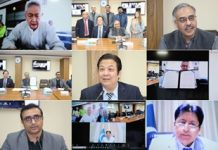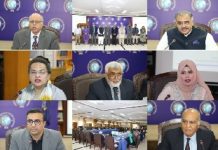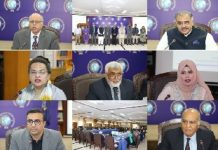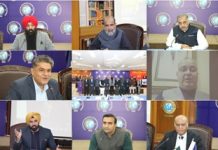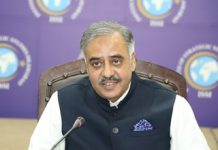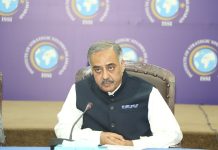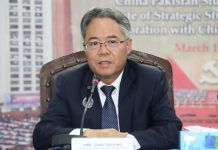Speech by the Chief Guest Ambassador Imran Ahmed Siddiqui, Additional Secretary, MoFA at the Seminar on “Prospects and Challenges of Regional Cooperation in South Asia: Role of SAARC”, ISSI, 19 December 2024

Ambassador Khalid Mehmood, Chairman, Institute of Strategic Studies, Islamabad
Ambassador Sohail Mahmood, Director General, Institute of Strategic Studies, Islamabad
Excellencies,
Scholars,
Ladies and Gentlemen,
It is a great pleasure, indeed, to address this august gathering. I thank you for affording me this opportunity to share my thoughts on the SAARC and its role in regional cooperation in South Asia.
Ladies and Gentlemen,
South Asia is home to almost a quarter of humankind. However, it is confronted with multiple challenges.
The region is considerably under-developed, notwithstanding decent rates of GDP growth in some countries.
In terms of human development, South Asia remains amongst the least-developed regions in the world. On the Human Development Index, its performance is better only than Sub-Saharan Africa and Small Island Nations.
According to the latest Global Hunger Index report, South Asia accounts for 40% of the undernourished people of the World. It has the highest child wasting rate, compared to any other region.
Many South Asian countries are highly vulnerable to adverse consequences of climate change. The floods and torrential rains, that Pakistan witnessed in 2022, are a case in point. They affected the lives and livelihood of around 33 million people. As the sea level rises, small island nations like Maldives are confronted with threats to their existence.
Intra-regional trade accounts for barely 5% of South Asia’s total foreign trade.
However, the region enjoys some strengths as well.
South Asia’s populace is characterized by a sizeable youth bulge, offering a vast pool of skilled and unskilled labor. The optimal use of the region’s human resources could help boost growth at the regional and global level.
Millions of South Asian expatriates, living in North America, Middle East, and parts of Europe and Asia Pacific, are another asset. Many of them are English-speaking and making positive contribution to their respective countries of living.
South Asia also consists of common physical and socio-cultural features that can serve as grounds for efficient cooperation. Geographically, all states, except Sri Lanka and Maldives, are situated in a single landmass. In addition, these states share similar institutional mechanisms, and common history and heritage, which inevitably bind them together.
Ladies and Gentlemen,
This was the milieu wherein SAARC was established in 1985. The organization symbolized collective resolve and hope of the region to overcome the common challenges through enhanced cooperation and collaboration. Although these aspirations remain largely unfulfilled, over last 40 years, SAARC has been successful in developing a network of regional bodies in diverse fields.
For most of its history, the Organization has provided a useful platform for regular interactions among political leaders, senior officials, professionals and businessmen. In the shape of SAFTA, the organization also contributed to significant tariff reduction among regional countries.
Ladies and Gentlemen,
In the interest of greater regional cooperation, Pakistan has always shown an unwavering commitment to promotion and protection of SAARC’s principles, purposes and priorities. Pakistan always remained engaged with all SAARC processes and activities, and strived to make constructive contributions to enhancing its mandated work.
We are proud to host institutions like SAARC Energy Center and SAARC Arbitration Council in Islamabad. Other bodies like SAARC Chamber of Commerce & Industry, South Asian Free Media Association and South Asian Federation of Exchanges are also based in Pakistan.
Pakistan organized the fourth and twelfth SAARC Summits in 1988 and 2004, respectively. It was again ready to host the 19th SAARC Summit in November 2016. However, as we all know, the Summit had to be postponed due to India’s intransigent attitude. Pakistan has also hosted Council of Ministers for four times: in December 1988, November 1989, January 2004, and July 2004.
In the wake of COVID-19 pandemic, Pakistan initiated the SAARC COVID-19 Emergency Fund and pledged US $ 3 million. Accordingly, medical equipment was provided to Bangladesh, Nepal, Maldives and Sri Lanka in June 2021.
Ladies and Gentlemen,
The SAARC processes have largely remained dormant in the past few years due to Pakistan-India tensions, effects of COVID-19 pandemic, and non-recognition of the Interim Afghan Government by the rest of the member states. However, there has been an incremental resumption of SAARC activities since last year. Meetings of the governing bodies of SAARC regional centers and specialized bodies have resumed since the last quarter of 2023. The 59th Session of the SAARC Programming Committee was held on 6-7 March 2024 in Kathmandu after the gap of more than three years – wherein all the organizational activities and processes were reviewed. The SAARC Secretary General, Ambassador Md. Golam Sarwar, also paid a visit to Pakistan from 20-24 May 2024.
These developments notwithstanding, the SAARC’s functioning remains far from normal. The Council of Ministers, comprising of Foreign Ministers, and the Standing Committee, consisting of Foreign Secretaries, have not met for years. Efforts are also being made to project BIMSTEC as an alternative to SAARC.
In any case, it is only through adhering to the principles of sovereign equality and mutual respect among Member States that SAARC will achieve the cherished goal of a prosperous, economically integrated and developed South Asia.
South Asia cannot realize its true potential in the absence of durable peace between Pakistan and India. Therefore, a peaceful settlement of Jammu and Kashmir dispute, in accordance with the relevant United Nations Security Council (UNSC) Resolutions and aspirations of the Kashmiri people, is essential.
Ladies and Gentlemen,
Since India’s boycott of the 19th SAARC Summit to be hosted by Pakistan, SAARC has lost its momentum. The organization has the vast untapped potential of regional development, connectivity and cooperation among countries of South Asia. It needs to be re-activated. In the absence of regional platforms like SAARC, renaissance of South Asia, as a developed and integrated region, would remain elusive.
Pakistan wants a peaceful, stable and prosperous South Asia, where no single country could impose its agenda on smaller neighbors. We remain hopeful that current hindrances to the SAARC’s smooth functioning will be removed, enabling the South Asian countries to forge ahead on the path of mutually-beneficial regional cooperation.
I thank you all!
*****




